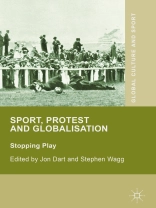This volume is built around three assumptions – first, that for huge numbers people around the world, including many sport lovers, there are more important things in life than sport; second, that the governance of sport is in many ways problematic and needs to be confronted; and, third, that contrary to the still-popular belief that sport and politics don’t mix, sport often provides an ideal theatre for the enacting of political protest. The book contains studies of a range of protests, stretching back to the death of suffragist Emily Davison at the Derby of 1913 and encompassing subsequent protests against the exclusion of women from the sporting arena; the Berlin Olympics of 1936; Western imperialism; the Mexico Olympics, 1968; the state racism of apartheid in South Africa; the effect of the global golf industry on ecosystems; Israeli government policy; resistance to the various attempts to bring the Olympic Games to Canadian and American cities; the cutting of welfare benefits fordisabled British citizens; class privilege in the UK; Russian anti-gay laws; and high public spending on sport mega-events in Brazil. The collection will be of interest to scholars and students with an interest in Sports Studies, History, Politics, Geography, Cultural Studies and Sociology.
Spis treści
1. ‘Deeds, Not Words’: Emily Wilding Davison and the Epsom Derby 1913 Revisited; Carol Osborne.- 2. Women’s Olympics: Protest, Strategy or Both?; Helen Jefferson Lenskyj.- 3. A Most Contentious Contest. Politics and Protest at the 1936 Berlin Olympics ; David Clay Large and Joshua J. H. Large.- 4. Splitting the World of International Sport: The 1963 Games of the New Emerging Forces and the politics of challenging the global sport order; Russell Field.- 5. “Memorias del ’68: Media, Massacre, and the Construction of Collective Memories” Celeste González de Bustamante.- 6. Race, Rugby and Political Protest in New Zealand: A Personal Account; John Minto.- 7. Fighting Toxic Greens: The Global Anti-Golf Movement (GAG’M) Revisitedl; Anita Pleumarom.- 8. ‘Human Rights or Cheap Code; Words for Antisemitism?’ The Debate over Israel, Palestine and Sport Sanctions; Jon Dart.- 9. ‘The Olympics Do Not Understand Canada’: Canada and the Rise of Olympic Protests; Christine M. O’Bonsawin’10. The Atos Games’: Protest, the Paralympics of 2012 and the New Politics of Disablement; Stephen Wagg.- 11. ‘Messing about on the river.’; Trenton Oldfield and the Possibilities of Sports Protest; Jon Dart.- 12. Sochi 2014 Olympics: Accommodation and Resistance; Helen Jefferson Lenskyj.- 13. An anatomy of resistance: the popular committees of the FIFA World Cup in Brazil; Christopher Gaffney.
O autorze
Jon Dart is Senior Lecturer in the Carnegie Faculty, Leeds Beckett University, UK. He has published on topics such as the political economy of sport and social media, sports fandom and sports policy in the Middle East. He has a particular interest in future of the relationship between sport and the social sciences within UK higher education institutions. Stephen Wagg is Professor in the Carnegie Faculty, Leeds Beckett University, UK. He has written widely on the politics of sport, as well as on the politics of childhood and of comedy. His latest book is The London Olympics of 2012: Politics, Promises and Legacy (Palgrave, 2015) and he edited The Palgrave Handbook of Olympic Studies (Palgrave, 2012) with Helen Jefferson Lenskyj.












